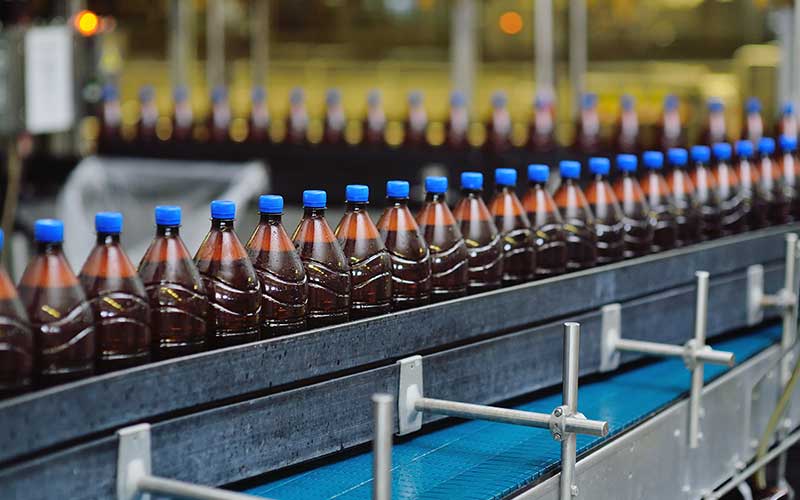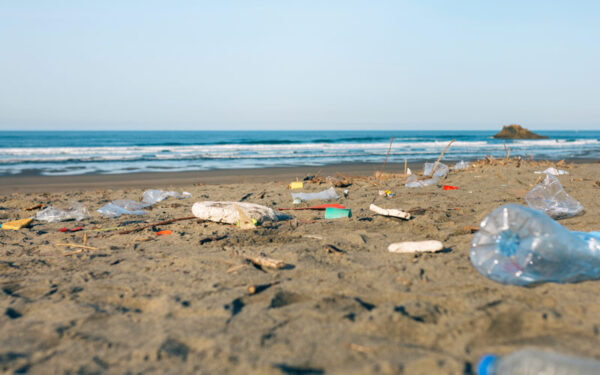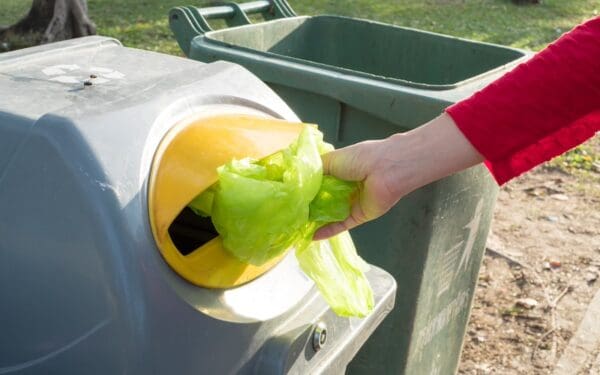
The beverage industry adamantly opposes Bottle Bill programs because such programs eat into profits. Photo: via Shutterstock
Big Beverage companies like Coca-Cola, PepsiCo, and Nestlé drive the global plastic pollution crisis, thanks to the single-use bottles in which they sell their beverages. They also do everything they can to maintain the status quo by sabotaging efforts to reform our recycling systems.
The fact is, Big Beverage has been perfecting a playbook of tactics to delay, distract, and derail recycling reform since the 1970s. That’s when Bottle Bills first started to gain traction in the U.S. Bottle redemption programs place a fee on bottles and cans that consumers get back when they return these containers. These programs are free to taxpayers, because the producers (like Coke, Pepsi, and Nestlé) pay for the handling fees required to fund the system.
Frankly, Bottle Bills are the most effective system we currently have for recycling all of those single-use beverage containers. Yet only ten states in the country have Bottle Bills on the books.
That’s why we’re exposing Big Beverage’s playbook – because we can no longer afford to let them avoid responsibility while we drown in plastic pollution.
The Beverage Industry’s Playbook: Delay, Distract, Derail
The beverage industry adamantly opposes Bottle Bill programs because such programs eat into profits. William Coors, president of Coors Brewing Company, testified in the mid-1970s – when Bottle Bills first gained public attention – that the industry spent a “minimum of $20 million a year fighting container deposit legislation” (that’s the equivalent of $143 million today). Between 1991 and 2011, the beverage industry outspent proponents of Bottle Bills by as much as 30 to 1, according to the U.S. Public Interest Research Group.
Along the way, the industry developed a systematic playbook designed to undermine any attempt to improve recycling through new or expanded Bottle Bills.
Let’s break down their playbook – tactic by tactic.
Tactic One: Blame the Consumer
One of the industry’s oldest, and perpetually effective, tactics is to blame the consumer for litter. The most blatant example is the industry-funded nonprofit Keep America Beautiful.
On Earth Day in 1971, Keep America Beautiful launched a now iconic advertising campaign featuring a person of Italian descent posing as a Native American. As he cries at the sight of litter, the tagline, “People start pollution. People can stop it” appears on the screen.
Fifty years later, Keep American Beautiful and its industry backers still perpetuate this consumer-responsibility myth to avoid the obvious truth: plastic and other beverage container pollution starts – and ends – with the companies that make and distribute these containers.
Tactic Two: Lobby to Defeat Bottle Bills
While the beverage industry’s nonprofit network hosts litter clean-ups to deflect public criticism, their army of lobbyists descend on state houses across the country to make sure their message is heard – and that their political funding gets delivered.
They also employ deep-pocketed public relations and media strategies, as well as astroturfing.
“Astroturfing” involves disguising the sponsor or backer of a message or organization so it looks like it originates from, or is supported by, concerned residents – not corporate interests with a financial stake in the issue. The idea is to give a message – for example, that a Bottle Bill will hurt consumers – the false appearance of grassroots authenticity.
Tactic Three: Silence Support for Systemic Change
Another trick used by the beverage industry is to provide just enough money to local recycling programs to forestall calls for more comprehensive reform. Coca-Cola and PepsiCo have developed a sophisticated network of organizations and nonprofits that distribute small grants to distressed communities struggling to pay for recycling. That money, while helpful on the surface, keeps those communities tied to the status quo – a broken and increasingly expensive recycling system.
Tactic Four: Make Promises, Then Break Them
More and more today, public pressure reaches the point of overwhelming support to implement or expand a Bottle Bill. That’s when the beverage industry rolls out and publicizes a new voluntary initiative or goal designed to deflect public outrage.
At first glance, these goals can sound like good-faith efforts to tackle waste, litter, and pollution. But underneath the slick presentations and ad campaigns lie voluntary commitments that never come to fruition.
Tactic Five: Play Along, Then Undermine
These four playbook tactics have kept new Bottle Bills at bay for decades. However, public concern over plastic pollution has risen to an all-time high. As a result, Bottle Bills have regained support and attention.
To appear responsive to this public outcry, Big Beverage now claims they’ve come around on Bottle Bills. William Dermody, Vice President of Media and Public Affairs for the industry interest group American Beverage, says the industry is now “open to discussion on any kinds of systems that will get our bottles back, including Bottle Bills.” However, this newfound support should be met with extreme skepticism.
We saw how this so-called support plays out last year in Connecticut. After a hard-fought battle to update that state’s Bottle Bill, the reins of the program were turned over to the industry. That’s a quintessential case of the fox guarding the henhouse, and it leaves Big Beverage in the perfect position to undermine the bill’s implementation and effectiveness.
Breaking Free from the Status Quo
Exposing and understanding Big Beverage’s playbook helps consumers and lawmakers break free from the status quo and modernize or pass new Bottle Bills, despite corporate opposition. The industry’s decades-long endeavor to maintain our failing recycling systems and prevent solutions is well documented. But now, the jig is up.
We know exactly how their playbook operates. Big Beverage should either embrace Bottle Bills – the single-most effective recycling policy ever created – or get out of the way.
Learn more about Big Beverage’s tactics to delay, distract, and derail recycling reform, as well what’s needed for Bottle Bills to be truly effective, in CLF’s report: The Big Beverage Playbook for Avoiding Responsibility.
The authors of the report would like to acknowledge Beyond Plastics, Break Free From Plastics, Changing Markets Foundation, Container Recycling Institute, and Reloop, without whose work this report would not have been possible.




